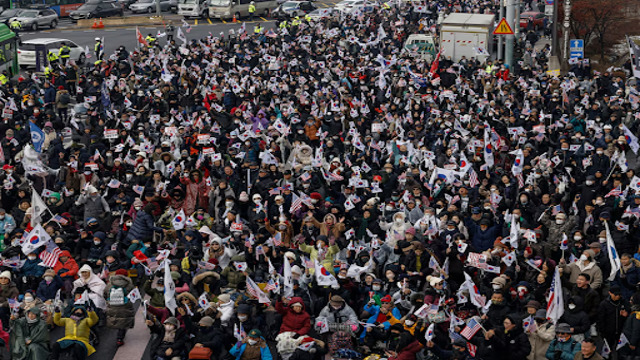
Supporters of impeached South Korean President Yoon Suk Yeol gathered near his official residence in Seoul, South Korea, on January 6, 2025, to show their backing during a rally. Reuters
South Korean investigators are pushing to extend the arrest warrant for impeached President Yoon Suk Yeol, intensifying the political turmoil surrounding the former leader. The move follows a failed attempt to execute the warrant last Friday when Yoon’s presidential security service formed a human chain to block investigators from reaching him.
The warrant, which expires at midnight Monday, stems from allegations of insurrection linked to Yoon’s controversial declaration of martial law on December 3. The act, which shocked the nation, led to an unprecedented arrest warrant against a sitting president. Yoon was impeached by Parliament on December 14, suspending his presidential duties while the Constitutional Court determines whether he should be permanently removed from office or reinstated.
The Corruption Investigation Office for High-ranking Officials (CIO) is leading the probe, accusing Yoon of orchestrating the martial law as part of an insurrection plot. However, the agency has faced mounting criticism for failing to execute the arrest warrant. In response, the CIO has requested police assistance in carrying out the warrant. Police officials are currently reviewing the request.
Lawmakers from South Korea's ruling People Power Party gathered outside the official residence of impeached President Yoon Suk Yeol in Seoul on January 6, 2025. Their presence aimed to block any efforts by the Corruption Investigation Office for High-Ranking Officials to carry out Yoon's arrest. Reuters
Yoon’s legal team, however, disputes the legality of the warrant and the investigation. On Monday, Yoon's lawyer, Seek Dong-hyeon, argued that the CIO’s request for police involvement highlights the investigation’s lack of authority under South Korean law. Meanwhile, a court has rejected an injunction filed by Yoon’s lawyers to nullify the arrest warrant and a search of his residence.
Adding to the political tension, acting President Choi Sang-mok, who assumed responsibilities after Yoon’s impeachment, has yet to respond to the CIO's plea for cooperation. Choi faces growing pressure to direct the presidential security service to comply with investigators.
The political upheaval has spilled into the streets, with rallies erupting on both sides of the divide. Yoon’s supporters, some led by Christian pastor Jun Kwang-hoon, have vowed to continue demonstrations near his residence. Jun framed the issue as a battle for freedom, accusing the media of bias and lamenting the absence of outlets like Fox News in South Korea.
Supporters of impeached South Korean President Yoon Suk Yeol held a rally near his official residence in Seoul on January 6, 2025, to show their support. Reuters
In the midst of this crisis, U.S. Secretary of State Antony Blinken is visiting South Korea to reaffirm support for its democracy. Blinken has voiced confidence in South Korea's democratic institutions and acting President Choi's leadership. His visit follows earlier criticism from U.S. officials regarding Yoon’s martial law declaration, which they described as a grave miscalculation.
As the deadline for the arrest warrant looms, the CIO plans to request an extension. If granted, the investigation will likely escalate further, deepening the divide between Yoon’s supporters and critics and testing the resilience of South Korea’s political and legal systems.















